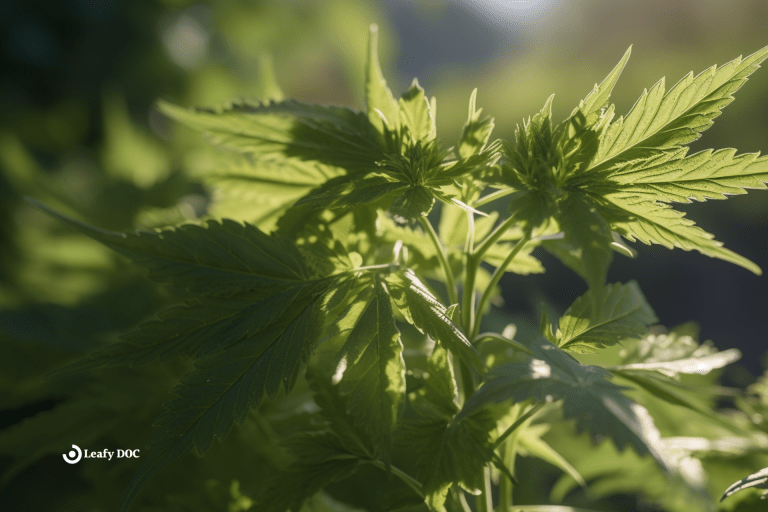Medical Marijuana for Women’s Health: Menstrual Cramps, Endometriosis, and More
by Haley Mills · April 14, 2023
Learn about the benefits of medical marijuana for women’s health, including menstrual cramps and endometriosis. Discover how cannabis can be used to alleviate symptoms and improve quality of life.

The use of medical marijuana has been a topic of growing interest and debate in recent years, with numerous studies highlighting its potential benefits for various health conditions. Its applications for women’s health issues have garnered significant attention.
In this article, we delve into the world of medical marijuana and its potential role in addressing some of the most prevalent and challenging women’s health problems, including menstrual cramps, endometriosis, and more. We will explore the current research, anecdotal evidence, and the potential mechanisms behind its therapeutic effects while discussing the legal and medical considerations surrounding its use.
Cannabis & Women’s Health Throughout History
Long before the advent of modern medicine, cannabis has been employed as a therapeutic agent in various cultures across the globe. Its use in addressing women’s health issues dates back to ancient civilizations. It was recognized for its unique properties in managing pain, inflammation, and other ailments specific to the female experience.
In ancient Egypt, cannabis was used as a remedy for many women’s health concerns, including menstrual cramps, urinary tract infections, and childbirth-related pain. Medical texts such as the Ebers Papyrus, dating back to 1550 BCE, make mention of cannabis as an effective treatment for these conditions. Similarly, traditional Chinese medicine has employed cannabis to treat various gynecological disorders for centuries. One notable Chinese medical text, the Shennong Bencaojing, written around 200 CE, describes using cannabis seeds to alleviate menstrual pain and reduce postpartum hemorrhage.
In the 19th century, cannabis was introduced into Western medicine as an effective treatment for various ailments, including women’s health issues. The renowned British physician, Sir John Russell Reynolds, prescribed cannabis to Queen Victoria as a remedy for her menstrual cramps, attesting to its efficacy in relieving such discomfort. Throughout the early 20th century, cannabis continued to be featured in many medical texts and pharmacopeias as a potent analgesic and antispasmodic agent for managing gynecological conditions.
This historical context of cannabis in women’s health care sheds light on its time-tested potential as a therapeutic option. As we uncover new insights into its properties and applications, we must remember that the relationship between cannabis and women’s health is not a novel concept but a natural progression of our understanding of this versatile plant’s role in alleviating human suffering.
Can medical marijuana use affect fertility?
While the existing research on the impact of medical marijuana on fertility is limited and somewhat inconclusive, some studies suggest a potential connection. Some evidence indicates that the active compounds in cannabis, such as tetrahydrocannabinol (THC), may interfere with the body’s endocannabinoid system (ECS), which plays a crucial role in regulating reproductive functions. Disruption of the ECS could potentially impact fertility in both men and women.
In men, cannabis use has been linked to decreased sperm count and motility, which could make it more difficult to conceive. For women, studies suggest that cannabis use may disrupt the menstrual cycle, ovulation, and implantation of a fertilized egg. However, more research is needed to establish a clear relationship between medical marijuana use and fertility and determine the long-term effects on the female reproductive system and optimal dosages for specific medical conditions.
It is essential to consult with a healthcare professional before using medical marijuana if you are planning to conceive, as they can provide personalized advice based on your unique medical history and female reproductive health circumstances.
Current Information on Prenatal Cannabis Exposure
Many studies have been conducted to assess the potential effects of self-reported prenatal cannabis exposure on fetal development, birth and child health outcomes, and later cognitive and behavioral development. However, the results of these studies are not entirely consistent, partly due to varying methodologies and difficulties in controlling for confounding factors such as tobacco and alcohol use, socioeconomic status, and prenatal care.
Some studies have reported associations between prenatal cannabis exposure and adverse neonatal outcomes such as low birth weight, preterm birth, and small-for-gestational-age infants. In addition, evidence suggests that prenatal cannabis exposure may be associated with cognitive and behavioral impairments in later childhood and adolescence, including attention deficits, memory problems, and increased risk of substance use disorders.
A review published in 2016 in the journal JAMA Pediatrics concluded that prenatal cannabis exposure was associated with a small but significant increase in the risk of adverse birth outcomes and that the evidence for long-term cognitive and behavioral effects remained inconclusive. Another review published in 2018 in the journal Obstetrics & Gynecology urged caution in interpreting the findings on prenatal cannabis exposure, noting that more research is needed to establish the true extent and nature of the risks involved.
Can I use Medical cannabis during pregnancy?
The use of medical cannabis during pregnancy is a complex and controversial topic. Most healthcare professionals advise against using cannabis during pregnancy due to potential risks to the developing fetus. Studies have shown that exposure to cannabis during pregnancy may be associated with an increased risk of low birth weight, preterm birth, and developmental delays. However, medical cannabis can relieve intense pregnancy symptoms like nausea, appetite loss, anxiety, stress, inflammation, and insomnia.
The American College of Obstetricians and Gynecologists (ACOG) recommends that pregnant women or those considering pregnancy should not use marijuana or other cannabis products, including for medical purposes. If you currently use medical cannabis and have become pregnant or plan to conceive, discussing your situation with your healthcare provider is essential. They can help you explore alternative treatments and develop a safe plan for managing your health and any adverse symptoms during pregnancy.
Top 7 Ways to Use Weed for Women’s Health
As the applications of medical marijuana for women’s health continue to gain traction, a growing number of women are exploring various ways to incorporate this versatile plant into their self-care routines. From pain management to mental well-being, cannabis has shown promise in addressing a wide range of health concerns specific to the female experience.
This section presents the top seven ways to use weed for women’s health. We offer a comprehensive guide to help you navigate different methods and products while highlighting their potential benefits and considerations. Whether new to medical marijuana or a seasoned user, these approaches can empower you to make informed decisions and discover the most suitable option for your unique needs and preferences.
Endometriosis
Medical marijuana (MMJ) has shown promise in managing the symptoms of endometriosis, a painful condition in which endometrial-like tissue grows outside the uterus. The anti-inflammatory and analgesic properties of cannabinoids, the active compounds in cannabis, can help alleviate pain and inflammation associated with endometriosis.
A study published in the Journal of Pain Research in 2020 reported that cannabis use was associated with a significant decrease in self-reported pain among endometriosis patients. Additionally, some researchers believe that cannabinoids may help reduce the formation and growth of endometrial lesions, although more research is needed to confirm these findings.
PMS
Premenstrual syndrome (PMS) affects many women and is characterized by various physical and emotional symptoms that occur in the days leading up to menstruation. Medical marijuana has been reported to help alleviate some of the most common PMS symptoms, including severe nausea, mood swings, irritability, and cramps.
The cannabinoids present in MMJ, such as THC and CBD, are known to interact with the endocannabinoid system, which plays a crucial role in regulating mood and pain. Although scientific evidence on MMJ’s effectiveness in treating PMS is limited, anecdotal reports suggest it may relieve many women.
Menstrual Pain
Menstrual pain, or dysmenorrhea, is a common issue women face during their menstrual cycles. Medical marijuana has been used historically to treat menstrual pain, and recent studies have begun to explore the scientific basis for its efficacy. The analgesic and anti-inflammatory properties of cannabinoids can help alleviate the pain and discomfort associated with menstrual cramps.
A 2019 study published in the Journal of Women’s Health found that a significant proportion of women reported using cannabis to manage menstrual pain, with most experiencing moderate to complete relief. However, more research is needed to determine the optimal dosage and strains for menstrual pain relief.
Anxiety & Stress
Women are more likely to experience anxiety and stress-related disorders compared to men, and medical marijuana has shown the potential to provide relief from these mental health conditions. Cannabinoids like CBD have been found to have anxiolytic and antidepressant properties, which may help in reducing anxiety and stress.
A 2015 review published in the journal Neurotherapeutics concluded that CBD shows promise as a treatment for various anxiety-related disorders, including generalized anxiety disorder, panic disorder, and social anxiety disorder. However, it is essential to note that strains high in THC may cause or exacerbate anxiety in some individuals. As a result, it is crucial for women seeking relief from anxiety and stress through MMJ to work with a knowledgeable healthcare provider to determine the appropriate strain and dosage for their needs.
Insomnia
Insomnia or trouble sleeping is a common sleep disorder that affects women more frequently than men. Medical marijuana has shown potential in treating insomnia by helping individuals fall asleep more quickly and improving sleep quality. Cannabinoids like THC and CBD interact with the endocannabinoid system, which regulates the sleep-wake cycle.
A 2019 review published in the journal Sleep Medicine Reviews concluded that cannabinoids could have a therapeutic effect on sleep disorders like insomnia, with THC showing the potential for reducing sleep latency and CBD possibly improving sleep quality. It is essential to consult with a healthcare provider to determine the most suitable strain and dosage for treating insomnia, as the effects of MMJ can vary between individuals.
Fibromyalgia
Fibromyalgia is a chronic pain disorder that affects more women than men, characterized by widespread musculoskeletal pain, fatigue, and tender points. Medical marijuana has shown promise in alleviating fibromyalgia symptoms due to its analgesic, anti-inflammatory, and muscle-relaxant properties.
A 2019 study published in the Journal of Clinical Rheumatology reported that medical cannabis use was associated with significant improvements in nerve pain, sleep quality, and overall quality of life among fibromyalgia patients. While these findings are encouraging, more research is needed to establish the most effective strains, cannabinoid ratios, and dosages for fibromyalgia treatment.
Perimenopause/Menopause
Perimenopause and menopause are transitional periods in a woman’s life that often come with various physical and emotional symptoms, such as hot flashes, night sweats, and mood swings. Medical marijuana has been proposed as a potential treatment to alleviate menopause-related symptoms, as cannabinoids like THC and CBD can interact with the endocannabinoid system, which regulates mood, temperature, and sleep in perimenopausal women.
A 2020 study published in the journal Menopause found that women who used cannabis reported a reduction in the frequency of hot flashes and night sweats, as well as improved mood and sleep. However, further research is needed to determine the most effective strains, ratios, and dosages of MMJ for the management of menopause symptoms.
In Conclusion
The potential benefits of medical cannabis for women’s health, particularly for menstrual cramps, endometriosis, and other related conditions, are becoming increasingly evident. While more research is needed to understand its mechanisms and long-term effects fully, the existing studies and anecdotal evidence suggest that it can be a promising option for women who have not found relief through traditional treatments.
As we navigate through the evolving landscape of medical marijuana, it is crucial for medical professionals, policymakers, and patients to stay informed about its potential applications and engage in open dialogue to ensure the safe and effective use of this alternative treatment option. Ultimately, empowering women with knowledge and access to diverse treatment options is essential to improving their overall well-being and quality of life.
Last Updated: August 8, 2024
Get Approved for Your Medical Marijuana Card in Minutes!

Get Your Medical Card
Connect with a licensed physician online in minutes

Like This Article?
Share with your friends
Table of Contents
Keep Reading
-
Cannabis Vs Prescription Drugs: A Comprehensive Comparison
Unlock the truth about cannabis vs prescription drugs! Dive into this in-depth analysis and discover which one dominates. Don’t miss out on eye-opening revelations – click now for an enlightening read!
-
What Are Plant Growth Regulators For Weed?
Unlock the full potential of your cannabis cultivation with plant growth regulators for weed. Revolutionize your growing techniques and become a pro today! Click now to discover the secret behind pgr weed and elevate your harvests to new heights.
-
How To Incorporate Cannabis In Your Meditation Practice
Unlock the secrets of enhancing your meditation practice with cannabis. Elevate your mind, body, and soul to new heights by learning how to incorporate cannabis in your meditation. Click now and elevate your practice today!



